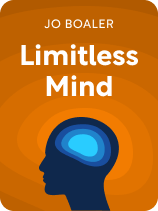

This article is an excerpt from the Shortform book guide to "Limitless Mind" by Jo Boaler. Shortform has the world's best summaries and analyses of books you should be reading.
Like this article? Sign up for a free trial here.
Can an old dog learn new tricks? Does your brain ever “max out” on learning?
In Limitless Mind, math educator Jo Boaler shows that the brain is capable of learning new skills and incorporating new ideas throughout our lives. She reminds us that we never stop being students and that we’re capable of continual education.
Read more to understand how you can keep on learning throughout your life.
Keep on Learning
Neuroscientists have discovered that the brain has much more capacity for development than was believed in the past. Boaler explains that scientists and educators have long believed that a person’s mental capacity is a fixed quantity that is set in stone early in life, and certainly by adulthood. Instead, we now understand that the human brain is constantly forming, rearranging, and discarding neural pathways to incorporate new information and skills. As a result, your brain never stops changing, and the belief that you have a built-in aptitude for certain skills or a set level of intelligence is now considered nonsense.
Because of what we now know about the brain, Boaler reiterates that anyone can keep on learning—forming new neural pathways, adopting new skills, and exploring fields of knowledge at any time in life. Implementing this idea not only helps students in school but also helps adults. Adopting the belief that you can always learn new things can help alleviate the mental decline that many people fear as they age. Recognizing that having difficulties is part of the learning process also frees you from the burden of always having to be right. When you accept that you don’t always have to be an expert and that not understanding something right away isn’t shameful, it lets you open up and ask others for help—which expands both your mind and your circle of support.
| Learning Opportunities for Adults The difference between childhood and adult learning is that unless you’re assigned training by your employer, your learning as an adult is entirely self-motivated. However, it’s been shown that self-directed learning greatly boosts your overall well-being. Among other benefits, lifelong learning keeps your brain active, helps you meet new people, and leads to greater feelings of personal fulfillment. While many online classes are available, if you learn best while working directly with other people, you can look for workshops and classes offered by hobbyist clubs, volunteer groups, your nearest public library, and extension courses offered by your local college or university. Various types of continuing education courses can give you the training and certifications you’d need to explore a change in career. You may even consider enrolling in college and earning a degree, whether or not you have one already. As many adults face logistical and emotional hurdles while going back to formal education, Rebecca Klein-Collins offers advice for managing them in Never Too Late. In particular, she recommends that you find a program that recognizes that the complexities of adult life are different from those of young, full-time students, and that assesses and lets you make use of the knowledge you’ve developed from a lifetime of experience. |

———End of Preview———
Like what you just read? Read the rest of the world's best book summary and analysis of Jo Boaler's "Limitless Mind" at Shortform.
Here's what you'll find in our full Limitless Mind summary:
- Why everything you thought you knew about natural abilities is wrong
- Why attitude is more important than aptitude when it comes to learning
- How to apply the science to boost your learning






